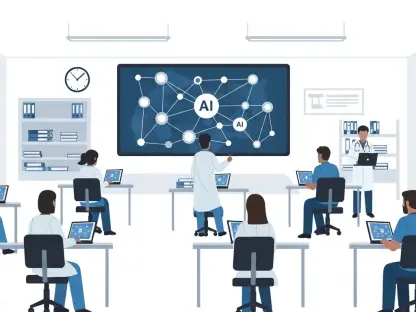The healthcare industry stands at a pivotal moment in 2025, grappling with an unprecedented surge in patient expectations while facing systemic constraints like provider shortages and escalating costs. A striking statistic reveals the urgency of this challenge: 27% of urgent care reviews highlight long wait times as a primary grievance, reflecting a broader demand for efficiency and respect for patients’ time. This dynamic underscores a critical need for innovation, with artificial intelligence (AI) emerging as a transformative force to bridge the gap between consumer-like expectations and traditional healthcare delivery. This report delves into how AI is reshaping patient care, addressing both operational hurdles and the human element of medical interactions.
The Changing Landscape of Healthcare and Patient Expectations
Healthcare is undergoing a profound shift toward consumerization, mirroring trends seen in retail and technology sectors. Patients now demand convenience, expecting seamless appointment scheduling and minimal delays, alongside personalized care that acknowledges their unique needs. Transparency, too, has become non-negotiable, as individuals seek clear communication about treatments and costs, driven by a desire for trust in their providers.
This transformation is fueled by technology, with AI positioned as a cornerstone for meeting these heightened expectations. Healthcare providers, alongside tech innovators, are leveraging AI to streamline operations and enhance patient interactions, even as they navigate challenges like a shrinking workforce and increasing patient volumes. Systemic issues, such as overburdened staff and limited resources, further complicate the landscape, making technological solutions not just beneficial but essential.
The stakes are high for the industry to adapt swiftly. Failure to meet these evolving demands risks eroding patient loyalty, while successful integration of AI offers a pathway to rebuild trust and improve outcomes. As patients increasingly view healthcare through a consumer lens, the pressure intensifies for providers to deliver experiences that rival other service industries in efficiency and empathy.
AI as a Game-Changer in Patient Care
Key Trends Driving AI Adoption
One of the most significant trends propelling AI in healthcare is the rise of the informed and empowered patient. With vast amounts of medical information and provider reviews accessible online, individuals arrive at appointments equipped with knowledge and specific expectations for care. This shift demands that providers not only listen but also tailor interactions to demonstrate understanding and respect for patient concerns.
AI tools are stepping in to meet this need for personalization with innovative solutions. Technologies like conversation transcription capture detailed patient-provider dialogues, freeing doctors to focus on engagement rather than note-taking. Additionally, AI-driven analysis of patient feedback helps identify areas for improvement, ensuring that care delivery aligns more closely with individual preferences and fosters a sense of empathy in every interaction.
These advancements signal a broader movement toward patient-centric care. By enabling providers to address unique needs through data-driven insights, AI is redefining how healthcare systems build rapport with patients. The focus is shifting from one-size-fits-all approaches to nuanced, meaningful exchanges that prioritize the human aspect of medicine.
Impact and Growth Potential of AI in Healthcare
Patient experience pain points remain a critical barrier to satisfaction, with data showing a 10% annual increase in urgent care reviews citing providers as “not listening” since 2025. Long wait times, mentioned in 27% of such reviews, further compound dissatisfaction, highlighting the urgent need for solutions that respect patients’ time and attention. These statistics paint a clear picture of the gaps in current healthcare delivery models.
Looking ahead, AI holds immense potential to address these issues at scale, from reducing provider workload through automated documentation to enhancing patient listening via sentiment analysis of feedback. Such capabilities can lead to measurable improvements, not only in satisfaction but also in clinical outcomes, as patients who feel heard are more likely to adhere to treatment plans and follow-up care.
The growth trajectory for AI in this space is promising, with projections suggesting widespread adoption across healthcare settings by 2027. By alleviating administrative burdens and providing actionable insights, AI empowers providers to focus on what matters most—delivering quality care. This forward-looking approach positions AI as a catalyst for systemic change, enhancing both efficiency and the quality of patient interactions.
Challenges in Implementing AI for Patient Care
Despite its potential, integrating AI into healthcare is not without obstacles. Technological complexities often hinder seamless adoption, as legacy systems struggle to interface with cutting-edge AI tools. Additionally, data privacy concerns loom large, with patients and providers alike wary of how sensitive information is handled in AI-driven platforms.
Resistance to change among healthcare staff presents another significant barrier. Many providers are accustomed to traditional methods and may view AI with skepticism, fearing it could depersonalize care or undermine their expertise. This cultural inertia can slow the pace of implementation, even when the benefits of AI are evident.
Solutions to these challenges lie in strategic approaches such as comprehensive staff training to build confidence in AI tools, alongside robust cybersecurity measures to safeguard data. Phased implementation, where AI is introduced gradually, can also ease the transition, allowing trust to develop over time. Addressing these hurdles head-on is crucial for realizing AI’s full potential in transforming patient care.
Regulatory and Ethical Considerations in AI-Driven Healthcare
Navigating the regulatory landscape is a critical aspect of deploying AI in healthcare. Laws like HIPAA in the United States set stringent standards for data protection, ensuring patient information remains confidential even as AI systems process vast datasets. Compliance with such regulations is non-negotiable for maintaining public trust and avoiding legal repercussions.
Ethical considerations also play a pivotal role, particularly around transparency in AI algorithms. Patients and providers need assurance that AI decision-making processes are fair and unbiased, which requires clear disclosure of how these systems operate. Ethical standards further demand that patient privacy is never compromised, even in pursuit of efficiency gains.
The impact of these frameworks on adoption rates cannot be overstated. Strict but fair regulations foster confidence among stakeholders, encouraging wider use of AI tools. Conversely, lapses in compliance or transparency can erode trust, stalling progress. Balancing innovation with accountability remains a key focus for shaping a responsible AI-driven healthcare ecosystem.
The Future of AI in Enhancing Patient Experiences
Emerging AI technologies are poised to further elevate patient care in the coming years. Predictive analytics, for instance, can optimize wait time management by forecasting peak periods and allocating resources accordingly, directly addressing a common patient frustration. Virtual assistants, meanwhile, offer new avenues for engagement, guiding patients through scheduling or answering routine queries with ease.
Evolving patient preferences, particularly a growing inclination for digital-first interactions, are likely to accelerate these trends. As global health challenges—such as aging populations and chronic disease prevalence—intensify, AI’s role in creating responsive systems becomes even more vital. The ability to adapt to these shifts through technology will define the next era of healthcare delivery.
Potential disruptors, including advancements in wearable health tech and telemedicine, could further amplify AI’s impact. These innovations promise to make care more accessible and proactive, aligning with a vision of healthcare that anticipates needs rather than merely reacting to them. The future hinges on leveraging such tools to build systems that are both efficient and deeply empathetic to patient experiences.
AI’s Dual Role in Efficiency and Empathy
Reflecting on the insights gathered, it becomes evident that AI has carved a unique space in healthcare by simultaneously tackling systemic inefficiencies and nurturing patient trust. The journey through various applications—from transcription tools to feedback analysis—shows how technology has begun to alleviate burdens on providers while ensuring patients feel valued and understood. This dual impact has laid a strong foundation for reimagining care delivery.
Looking back, the challenges of integration and regulatory compliance have posed significant hurdles, yet they also spurred critical discussions on building robust, trustworthy systems. The path forward appears clearer with each step taken to address privacy concerns and cultural resistance. These efforts have set a precedent for balancing innovation with ethical responsibility.
For the future, healthcare stakeholders should prioritize scalable AI solutions that enhance personalization without losing the human touch, investing in training and cybersecurity as cornerstones of adoption. Collaborating across sectors to refine predictive tools and digital interfaces could further elevate patient satisfaction. Ultimately, the focus must remain on harnessing AI to strengthen connections, ensuring that empathy remains at the heart of every technological advancement.









